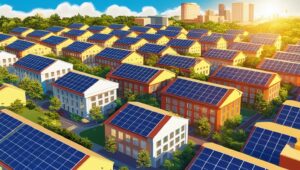Slash Your Carbon Footprint with Solar Panels: Carbon Emissions
The UK’s commitment to net-zero carbon emissions by 2050 signals a turning point in our energy landscape. This ambitious target demands a collective shift towards renewable energy sources. Solar panels stand out as a key player in this transition. They provide a clean, sustainable alternative to fossil fuels, effectively reducing carbon emissions and combating climate change.

Deconstructing Carbon Emissions
Carbon emissions, primarily stemming from the burning of fossil fuels, are greenhouse gases released into the atmosphere. These gases trap heat, contributing to global warming and its associated consequences. The main culprits behind these emissions include:
- Electricity generation: The traditional method of generating electricity relies heavily on burning coal, oil, and gas.
- Transportation: Cars, trucks, and airplanes, largely dependent on gasoline and diesel, contribute significantly to carbon emissions.
- Industry: Manufacturing processes and factories often rely on fossil fuels for their energy needs.
- Residential: Heating our homes and powering appliances often involves the use of fossil fuels.
Solar Panels: Your Weapon Against Carbon Emissions
Solar panels present a game-changing solution. They generate electricity from sunlight without producing harmful carbon emissions. By embracing solar energy, you directly reduce your reliance on fossil fuels and actively participate in creating a cleaner environment. Here’s how:
- Clean energy generation: Solar panels harness the power of the sun to convert sunlight into electricity, all without releasing carbon dioxide or other pollutants.
- Reduced carbon footprint: Switching to solar energy significantly diminishes your household’s carbon footprint, a crucial step in mitigating climate change.
- Offsetting fossil fuel consumption: Solar panels decrease the demand for electricity generated from fossil fuels, leading to an overall reduction in carbon emissions.
Calculating the Impact: How Much Can You Reduce?
The precise amount of carbon emissions reduced by your solar panels depends on a few key factors:
- System size: Larger solar panel systems generate more electricity, leading to a greater offset of emissions. Consider your energy needs and roof space when determining the optimal system size.
- Energy consumption: The more electricity you consume, the more significant the impact of switching to solar. Analyse your energy bills to understand your consumption patterns.
- Location: Areas with abundant sunshine generate more solar energy, resulting in higher emission reductions.
Research indicates that a typical residential solar panel system can reduce carbon emissions by several tonnes each year. This is comparable to planting hundreds of trees or removing multiple cars from the road. Imagine the collective impact if every household made the switch!

Beyond Carbon Reduction: The Ripple Effect of Solar Benefits
Solar panels offer a wealth of benefits beyond reducing carbon emissions:
- Cost savings: Solar energy can significantly reduce your electricity bills, freeing up your finances for other priorities.
- Energy independence: Generate your own power and reduce your reliance on the grid. This provides a sense of security and control over your energy supply.
- Increased property value: Homes equipped with solar panels often command a higher price in the real estate market, making it a smart investment.
- Low maintenance: Solar panels require minimal maintenance and boast a long lifespan, ensuring years of worry-free operation.
Maximizing Your Solar Investment: Tips for Success
- Optimize panel placement: Ensure your solar panels are installed in a location that receives maximum sunlight throughout the day.
- Monitor your system: Regularly monitor your solar panel system’s performance to identify any potential issues and ensure optimal energy generation.
- Consider battery storage: Battery storage allows you to store excess solar energy generated during the day for use at night or during periods of low sunlight. This further enhances your energy independence and maximizes your savings.
- Explore available incentives: The UK government offers various incentives and schemes to encourage the adoption of solar energy. Research these options to see if you qualify for any financial assistance.

Starks Solar: Your Partner in Solar Energy
Starks Solar is your trusted solar panel installation provider in Hampshire, Dorset, and Wiltshire. We are committed to helping you harness the power of the sun and reduce your carbon footprint and carbon emissions. Our services include:
- Expert advice: Our experienced team will assess your energy needs and design a solar panel system tailored to your home.
- Quality installations: We use only high-quality components and adhere to industry best practices to ensure professional installation and optimal performance.
- Ongoing support: We provide comprehensive maintenance and support services to ensure your system operates at peak efficiency for years to come.
Contact us today at 01425 460419 or visit our website https://starks.solar to learn more about how solar panels can help you reduce your carbon emissions and contribute to a greener future.
Related Services:
External Resources:
- Department for Business, Energy & Industrial Strategy (BEIS)
- Energy Saving Trust
- Renewable Energy Association (REA)

Solar Panels and the Environment: A Deeper Dive
Solar panels are more than just a source of clean energy. They represent a commitment to environmental responsibility and a sustainable future. Let’s explore the environmental impact of solar panels in more detail.
Reducing Air Pollution
Traditional electricity generation from fossil fuels releases harmful air pollutants, including:
- Sulphur dioxide: Contributes to acid rain and respiratory problems.
- Nitrogen oxides: Contribute to smog and respiratory problems.
- Particulate matter: Can cause respiratory and cardiovascular problems.
Solar panels produce electricity without releasing any of these pollutants, contributing to cleaner air and improved public health.
Conserving Water Resources
Many traditional power plants require large amounts of water for cooling purposes. This can strain water resources, especially in areas prone to drought. Solar panels, on the other hand, require minimal water for operation and maintenance.
Protecting Biodiversity
Fossil fuel extraction and transportation can disrupt ecosystems and harm wildlife. Solar panel installations, especially on rooftops or existing developed land, have a minimal impact on biodiversity.
Mitigating Climate Change
Climate change is one of the most pressing challenges facing our planet. Solar panels help mitigate climate change by reducing greenhouse gas emissions. The transition to solar energy is crucial for limiting global warming and its associated impacts.
Lifecycle Considerations
While solar panels offer significant environmental benefits, it’s important to consider their full lifecycle. This includes the manufacturing, transportation, installation, operation, and end-of-life management of solar panels.
- Manufacturing: The production of solar panels involves the use of energy and resources. However, advancements in manufacturing processes are continually reducing the environmental impact and carbon emissions.
- Transportation: Transporting solar panels from the manufacturing site to the installation site can generate emissions. However, this impact is relatively small compared to the emissions avoided over the lifetime of the panels.
- Installation: Proper installation is crucial to ensure the safety and efficiency of solar panels. Choose a qualified installer with a proven track record.
- Operation: Solar panels require minimal maintenance and have a long lifespan, typically 25/30 years or more.
- End-of-life management: Recycling programs for solar panels are becoming increasingly available, ensuring that materials are recovered and reused.
Solar Panels and Your Home: A Practical Guide
Thinking about going solar? Here’s a practical guide to help you make informed decisions:
Assessing Your Needs
- Energy consumption: Analyse your energy bills to understand your electricity usage patterns. This will help determine the appropriate size for your solar panel system.
- Roof suitability: Evaluate your roof’s size, orientation, and angle to ensure it’s suitable for solar panel installation. South-facing roofs with a tilt of around 30 degrees are generally ideal.
- Shading: Identify any potential sources of shading, such as trees or nearby buildings. Shading can significantly reduce the efficiency of your solar panels.
Choosing the Right System
- Panel type: There are various types of solar panels available, each with its own advantages and disadvantages. Research the different options to find the best fit for your needs.
- Inverter: The inverter converts the direct current (DC) generated by your solar panels into alternating current (AC) that can be used in your home. Choose an inverter that is compatible with your solar panel system and energy needs.
- Battery storage: Consider adding battery storage to your solar panel system to maximize your energy independence and savings.
Finding a Qualified Installer
- Experience: Choose an installer with extensive experience in solar panel installations.
- Certifications: Look for installers who are certified by reputable organizations, such as the Microgeneration Certification Scheme (MCS).
- Warranty: Ensure the installer offers a comprehensive warranty on their workmanship and the solar panel system components.
Financial Considerations
- Initial investment: The upfront cost of solar panel installation can vary depending on the system size and complexity. However, various financing options are available to make solar more affordable.
- Return on investment: Solar panels can provide a significant return on investment over their lifespan through reduced energy bills and potential feed-in tariffs.
- Government incentives: Research available government incentives and schemes that can help reduce the cost of solar panel installation.
Maintenance and Monitoring
- Regular cleaning: Keep your solar panels clean to ensure optimal performance.
- System monitoring: Monitor your system’s performance regularly to identify any potential issues.
- Professional maintenance: Schedule periodic professional maintenance to ensure your system operates efficiently.
Solar Panels FAQ: Lifespan, Performance & Installation Tips
Q: How long do solar panels last?
A: Solar panels typically have a lifespan of 25/30 years or more.
Q: Do solar panels work in cloudy weather?
A: Yes, solar panels can still generate electricity in cloudy weather, although their output will be reduced.
Q: Can I install solar panels myself?
A: While it’s technically possible to install solar panels yourself, it’s generally recommended to hire a qualified installer to ensure safety and optimal performance.
Q: What happens to my solar panels at night?
A: Solar panels do not generate electricity at night. However, you can store excess energy generated during the day in a battery for use at night.
Q: Are there any government incentives for solar panel installation?
A: Yes, the UK government offers various incentives and schemes to encourage the adoption of solar energy.
Q: How much can I save on my energy bills with solar panels?
A: The amount you can save on your energy bills with solar panels depends on several factors, including your energy consumption, system size, and location.
Q: Do I need planning permission to install solar panels?
A: In most cases, you do not need planning permission to install solar panels on your home. However, there are some exceptions, so it’s always best to check with your local planning authority.
Remember: Switching to solar energy is not just an investment in your home; it’s an investment in the future of our planet. Take the first step towards a cleaner, more sustainable future with Starks Solar. Contact us today!
Related Services:
External Resources:
- Department for Business, Energy & Industrial Strategy (BEIS)
- Energy Saving Trust
- Renewable Energy Association (REA)
So if you would like to Reduce Carbon Emissions and go Solar, plug in to the sun with Starks Solar, call us today on 01425 460419 to find out more!
[bookly-form category_id=”1″ service_id=”2″]

One Response